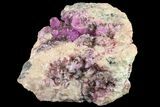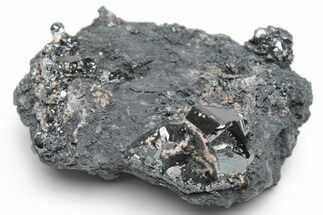This Specimen has been sold.
2.3" Cobaltoan Calcite Crystal Cluster on Dolomite - Morocco
This is a cluster of pink cobaltoan calcite crystals that formed from a dolomite matrix, collected from Bou Azzer, Morocco.
Cobaltoan calcite, also known as cobaltocalcite, is one of many different varieties of calcite, forming with a chemical composition of (Ca,Co)CO3. It crystallizes in a trigonal crystal system and forms rhombohedral or scalenohedral crystals. These crystals tend to display a pink color that ranges anywhere from a pinkish-salmon to a hot pink.
Dolomite is an anhydrous carbonate mineral composed of calcium magnesium carbonate (CaMg(CO3)2).
The mineral dolomite crystallizes in the trigonal-rhombohedral system. It forms white, tan, gray, or pink crystals. Dolomite is a double carbonate, having an alternating structural arrangement of calcium and magnesium ions. It does not rapidly dissolve in dilute hydrochloric acid as calcite does. Crystal twinning is common.
Dolomite was first described by Carl Linnaeus in 1768, and in 1791 it was described as a rock by the French naturalist and geologist Déodat Gratet de Dolomieu. He first recognized the material in buildings of the old city of Rome, and later as samples collected in the mountains known as the Dolomite Alps of northern Italy.
The mineral dolomite crystallizes in the trigonal-rhombohedral system. It forms white, tan, gray, or pink crystals. Dolomite is a double carbonate, having an alternating structural arrangement of calcium and magnesium ions. It does not rapidly dissolve in dilute hydrochloric acid as calcite does. Crystal twinning is common.
Dolomite was first described by Carl Linnaeus in 1768, and in 1791 it was described as a rock by the French naturalist and geologist Déodat Gratet de Dolomieu. He first recognized the material in buildings of the old city of Rome, and later as samples collected in the mountains known as the Dolomite Alps of northern Italy.
SPECIES
Calcite var. Cobaltoan Calcite & Dolomite
LOCATION
Bou Azzer, Morocco
SIZE
2.3" wide
CATEGORY
SUB CATEGORY
ITEM
#159433
 Reviews
Reviews













